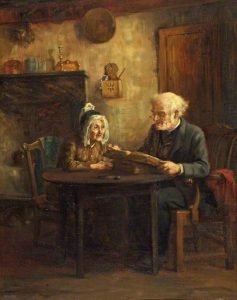וַיַּקְהֵל / פְקוּדֵיּ
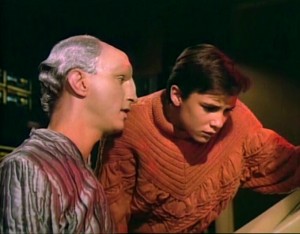
What is the secret of the success of Star Trek? Since 1966 three generations of science fiction fans have followed the adventures of four separate crews on the starship Enterprise, as well as other heroes of Gene Roddenberry’s creation through six TV series and 12 movies. There must be something more to the Star Trek universe than adventure stories, special visual effects, and outlandish aliens. Perhaps it is that Star Trek provides us with an opportunity to imagine, to push the boundaries of what is “real”, at least according to what we encounter in our everyday lives.
Certainly that was a key ingredient in the original series, the popularity of which has long outlived the three short seasons it was on the air. In 1987, Star Trek: The Next Generation picked up the mantle and carried on that boundary-pushing tradition. In “Where No One Has Gone Before”, the fifth episode of its first season, a propulsion expert named Kosinski (Stanley Kamel) comes aboard the USS Enterprise to make modifications to the ship’s engines that will enhance their performance. What we soon learn is that Mr. Kosinski’s equations are meaningless by themselves; the real power behind the modifications is the presence of Kosinski’s assistant, an alien known only as the Traveler (Eric Menyuk). In the first test, the Enterprise moves faster than ever thought possible into a region of space far beyond our galaxy, a result which astonishes not only the ship’s officers, but Kosinski as well. Only young Wesley Crusher (Wil Wheaton) notices the Traveler’s role in the proceedings. As the officers argue among themselves, he draws near to the Traveler to learn the truth. Their conversation includes a very interesting bit of dialogue:
Wesley: Is Mister Kosinski like he sounds? A joke?
Traveler: No, that’s too cruel. He has sensed some small part of it.
Wesley: That space and time and thought aren’t the separate things they appear to be? I just thought the formula you were using said something like that.
Later in the episode, the Traveler explains, “You do understand, don’t you that thought is the basis of all reality? The energy of thought, to put it in your terms, is very powerful.” And with that we have an articulation from a fantastic science fiction television show of a profound truth first explained by Moses 3,500 years ago.
At first glance it would not seem that the last few chapters of Exodus unlock the secrets of the space-time continuum. The Torah portions Vayahkel and Pekudei (Exodus 35:1-40:38) relate how the people of Israel brought freewill contributions for the Tabernacle, how the Holy Spirit empowered Bezaleel of Judah and Oholiab of Dan to build it, and how it was completed and set up on the first day of the second year after the nation left Egypt. There is much repetition in those chapters, stating once again the specifics of the tent, the furniture within it, the Bronze Altar and other items in the court, and the garments of the priests. There is nothing in these passages to indicate anything about the relationship of Space, Time, and Thought.
Except, of course, how these Torah portions begin and end. Take a look at how Moses chose to do that:
Then Moses assembled all the congregation of the sons of Israel, and said to them, “These are the things that the Lord has commanded you to do: For six days work may be done, but on the seventh day you shall have a holy day, a sabbath of complete rest to the Lord; whoever does any work on it shall be put to death. You shall not kindle a fire in any of your dwellings on the sabbath day.” (Exodus 35:1-3 NASB, emphasis added)
Then the cloud covered the tent of meeting, and the glory of the Lord filled the tabernacle. Moses was not able to enter the tent of meeting because the cloud had settled on it, and the glory of the Lord filled the tabernacle. Throughout all their journeys whenever the cloud was taken up from over the tabernacle, the sons of Israel would set out; but if the cloud was not taken up, then they did not set out until the day when it was taken up. For throughout all their journeys, the cloud of the Lord was on the tabernacle by day, and there was fire in it by night, in the sight of all the house of Israel. (Exodus 40:34-38 NASB)
How interesting. This section begins with the Sabbath (Shabbat) and ends with the Glory of YHVH. There must be a connection somehow. Perhaps we can find it if we consider why Moses chose to emphasize the Sabbath at this point.
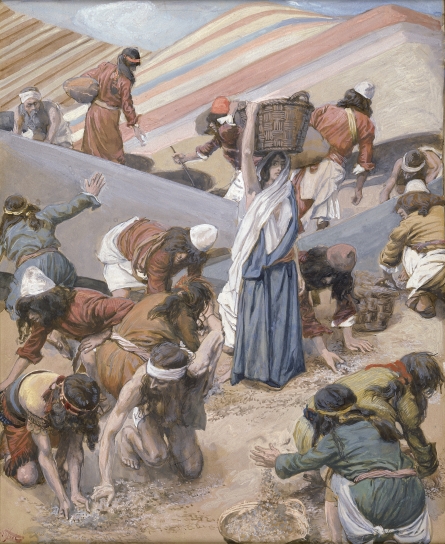
James Tissot
When we look at the book of Exodus as a whole, we find that this passage in chapter 35 is the fifth set of instructions about Shabbat. The first occasion happens as the people set out into the Arabian desert on the journey from the Red Sea to Mount Sinai. Exodus 16 explains that when they complained about not having any food, God provided manna and quail. Moses instructed the people to gather the manna during six days of the week, and on the sixth day gather twice as much so they could rest on Shabbat. Since some of the people had a problem following these instructions, the Lord had need to explain the requirement once more:
It came about on the seventh day that some of the people went out to gather, but they found none. Then the Lord said to Moses, “How long do you refuse to keep My commandments and My instructions? See, the Lord has given you the sabbath; therefore He gives you bread for two days on the sixth day. Remain every man in his place; let no man go out of his place on the seventh day.” So the people rested on the seventh day. (Exodus 16:27-30 NASB, emphasis added)
The second Shabbat instructions came about three weeks later, at Shavuot (Pentecost), when God spoke directly to the people to give them the Ten Commandments. When He gave the Fourth Commandment, the Lord said:
Remember the sabbath day, to keep it holy. Six days you shall labor and do all your work, but the seventh day is a sabbath of the Lord your God; in it you shall not do any work, you or your son or your daughter, your male or your female servant or your cattle or your sojourner who stays with you. For in six days the Lord made the heavens and the earth, the sea and all that is in them, and rested on the seventh day; therefore the Lord blessed the sabbath day and made it holy. (Exodus 20:8-11 NASB, emphasis added)
Immediately after that, the Lord explained more provisions for His Shabbat to Moses. Just before he went up on the mountain to get specific instructions on the Tabernacle and the priesthood, Moses related these instructions to the people. In this third set of instructions we gain some additional insights regarding the Sabbath:
You shall sow your land for six years and gather in its yield, but on the seventh year you shall let it rest and lie fallow, so that the needy of your people may eat; and whatever they leave the beast of the field may eat. You are to do the same with your vineyard and your olive grove. Six days you are to do your work, but on the seventh day you shall cease from labor so that your ox and your donkey may rest, and the son of your female slave, as well as your stranger, may refresh themselves. Now concerning everything which I have said to you, be on your guard; and do not mention the name of other gods, nor let them be heard from your mouth. (Exodus 23:10-13 NASB, emphasis added)
Apparently the Sabbath is not only the seventh day of the week, but the seventh year as well. Later we will see that this requirement regarding the seventh year (Shemitah) apparently applies only after the nation of Israel is established in the Promised Land (Leviticus 25:1-7). However, it seems that the Lord would like us to start thinking about this principle even out in the nations, just as our ancestors did when they were in the wilderness. They, and we, are also to take note of another important aspect of Shabbat: there is a connection between observing Shabbat and remaining true to YHVH. His command about not mentioning other gods is paired with this Shabbat instruction, leaving us to infer that if we keep Shabbat, we are less likely to stray into idolatry. The truth of this bears out in that unfortunate incident of the Golden Calf which occurred at the base of Mount Sinai while Moses was receiving the tablets of the Law. Instead of following God’s commandments, the people decided to make an idol that represented YHVH according to their own understanding. In other words, they chose to put God in a box of their own making. We may surmise that, if the people already had problems keeping the Sabbath holy, then they likely had a problem distinguishing the One True God from the images of the false gods they had known in Egypt. Here we make the first link connecting Time and Space and Thought: what entered the minds of the people about the Deity they worshipped translated into the way they chose to worship and the time they set aside for worship. And thus we get to the fourth set of Shabbat instructions, uttered by the Lord at the very time that the people chose to go their own way:
The Lord spoke to Moses, saying, “But as for you, speak to the sons of Israel, saying, ‘You shall surely observe My sabbaths; for this is a sign between Me and you throughout your generations, that you may know that I am the Lord who sanctifies you. Therefore you are to observe the sabbath, for it is holy to you. Everyone who profanes it shall surely be put to death; for whoever does any work on it, that person shall be cut off from among his people. For six days work may be done, but on the seventh day there is a sabbath of complete rest, holy to the Lord; whoever does any work on the sabbath day shall surely be put to death. So the sons of Israel shall observe the sabbath, to celebrate the sabbath throughout their generations as a perpetual covenant.’” (Exodus 31:12-16 NASB, emphasis added)
Here is the greatest significance of the Sabbath: it is not just a day of rest. It is not merely something God Himself has set apart as important. It is the very sign that God has established with His people. And thus we get to the heart of the matter. By celebrating Shabbat we acknowledge that it is YHVH Himself Who sanctifies us, meaning that He has set us apart as a holy people for Himself. Thus we acknowledge His Godship because we enter into the time He has designated as the people He has designated. Not only that, but since the strangers who dwell among us are to observe Shabbat as well, we help them enter into the Lord’s holy time so that they, too, may one day enter into His holy Presence as His holy people. And that is the covenant He makes with Israel: to be the vessel for His Presence on earth so that all the nations may encounter His peace and enter into His salvation.
To review, here is what the book of Exodus tells us the Lord explained to Moses about Shabbat:
- Shabbat is a gift from the Lord to us. It is not a burden, but a gift, just like Messiah Yeshua is His gift to us. Do not take God’s gifts lightly.
- Everyone should remain in his or her place on Shabbat. What exactly that means is largely up to interpretation as the Holy Spirit leads. In our family, it means remaining close to our home.
- Remember Shabbat. This is no passive thing. Shabbat is something to which we look forward and for which we plan. We do not just “let it happen”.
- Keep Shabbat holy. God has made Shabbat holy. Our task is to keep it that way. Shabbat should become ingrained in our consciousness like a habit, but it should not be routine. Every Shabbat is to be special for us because it is the day we get to spend designated time with our Creator.
- Labor on the other six days of the week. We have so much time to do what is necessary according to our priorities. Do not let those six parts of our time infringe on the last 7th.
- Do not do any work on Shabbat. God commands us to take the day off. Is this so hard to understand?
- Our children, our servants, our animals, and the strangers who dwell among us are to refrain from work on Shabbat. God wants everyone to take the day off.
- Follow God’s example of labor on six days and rest on the seventh. If God rested, why should we insist on doing otherwise?
- Refresh ourselves on Shabbat. This is the purpose of resting.
- Observe YHVH’s Shabbats. This is no human invention; these are the Shabbats of Holy God. We ignore them to our own hurt.
- Shabbat is a sign between YHVH and us, His people, forever. If we observe Shabbat, others will know we are the people of God. Perhaps more importantly, we will know we are the people of God.
- Shabbat is holy to us. If we would like to understand holiness, the first place we should look for instruction is Shabbat.
- Shabbat is holy to the Lord. If He says it is holy, who are we to disagree with Him? Is that not how we got into this mess in the first place?
- Shabbat is a perpetual covenant – between us and God, and among ourselves.
- Celebrate Shabbat. This is what Yeshua instructed us in all His contention with the religious leaders of His day about Shabbat. They had made the day an unbearable burden, but God always meant it to be a joyous time.
- Do not kindle a fire in any of our dwellings on Shabbat. Shabbat is not a normal day. Therefore refrain from “normal” activity on Shabbat (another commandment subject to interpretation as the Holy Spirit leads).
This is just from Exodus. There is more in the rest of Scripture to inform our understanding about Shabbat, particularly Isaiah 56:1-8 and Isaiah 58. Our Creator God takes this seriously, so it would be wisdom on our part to learn why. And to learn that lesson we must go back to the very beginning.
When we look at the creation account in Genesis 1 and 2, we find that the crown of God’s creative work occurred on the Sixth Day, when He made human beings.
Then God said, “Let Us make man in Our image, according to Our likeness; and let them rule over the fish of the sea and over the birds of the sky and over the cattle and over all the earth, and over every creeping thing that creeps on the earth.” God created man in His own image, in the image of God He created him; male and female He created them. God blessed them; and God said to them, “Be fruitful and multiply, and fill the earth, and subdue it; and rule over the fish of the sea and over the birds of the sky and over every living thing that moves on the earth.” Then God said, “Behold, I have given you every plant yielding seed that is on the surface of all the earth, and every tree which has fruit yielding seed; it shall be food for you; and to every beast of the earth and to every bird of the sky and to every thing that moves on the earth which has life, I have given every green plant for food”; and it was so. God saw all that He had made, and behold, it was very good. And there was evening and there was morning, the sixth day. (Genesis 1:26-31 NASB)
So the Creator made our first ancestors, then He told them why He had made them (to have dominion over the earth), and then He told them what to eat. What then? He and they took the next day off:
Thus the heavens and the earth were completed, and all their hosts. By the seventh day God completed His work which He had done, and He rested on the seventh day from all His work which He had done. Then God blessed the seventh day and sanctified it, because in it He rested from all His work which God had created and made. (Genesis 2:1-3 NASB)
The first thing God blessed and sanctified was the Seventh Day. Why? Certainly He was not tired. Perhaps we have the answer to that in the next chapter of Genesis, when we see God walking in the Garden of Eden in the cool of the day, looking for His favored creatures. If He was looking for them then, we can infer that He was accustomed to walking with them on other days. And not just on any other days, but on the day He had set aside. Imagine what happened on that Sixth Day of creation, when Adam’s eyes opened and Eve took her first breath. Their Creator spoke kindly to them, welcoming them into existence. Then He explained what they were to do in His creation. And then He said something like this: “But do not worry yourselves about that just now. You will learn it all in time. The evening has drawn upon us, so let us rest. In the morning we will walk through this Garden together and I will show you wondrous things.”
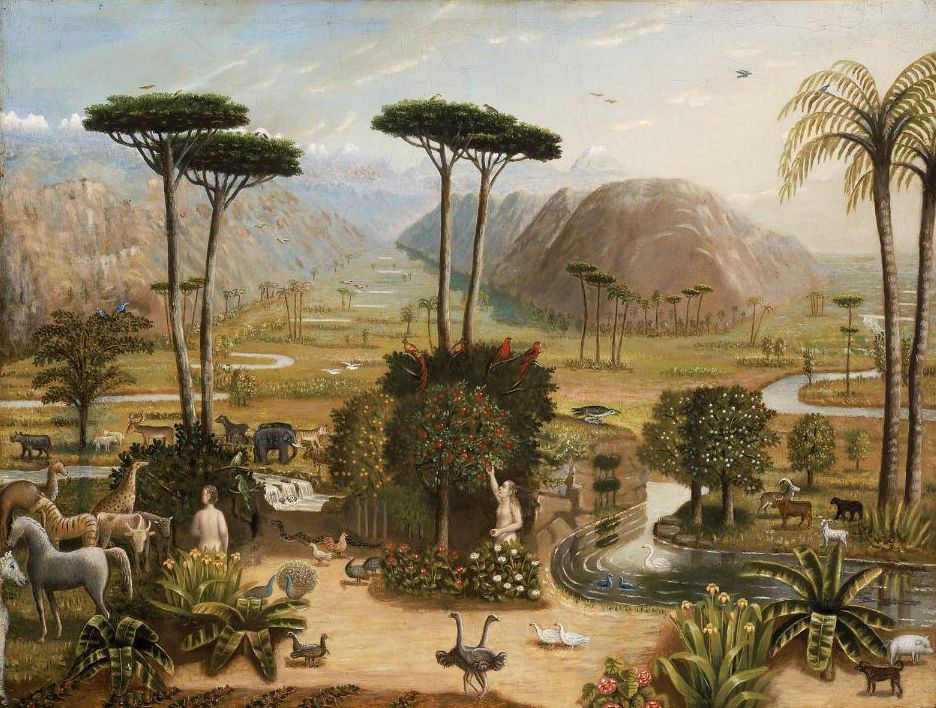
Erastus Salisbury Field
And that is just what they did. Hand in hand, YHVH walked with the Man and the Woman, pointing out the intricate patterns of the grass, laughing with them at the antics of the monkeys and squirrels, marveling at the power of the lion and the ox, and pondering the delicacy of the spider’s web. Together they tasted the sweet fruits of every tree they passed. They had no need to gather; after all, that would be work. Yet to pluck a pear from a tree or grain from a stalk of wheat would be no work, even as it was not work for Yeshua’s disciples as they passed through the fields of Judea. Neither was there need for instruction in what not to eat; that would come later, when the next week began on the following day. That is when we learn these instructions of the Lord:
Then the Lord God took the man and put him into the garden of Eden to cultivate it and keep it. The Lord God commanded the man, saying, “From any tree of the garden you may eat freely; but from the tree of the knowledge of good and evil you shall not eat, for in the day that you eat from it you will surely die.” (Genesis 2:15-17 NASB)
Why did God do it that way? Why did He not start with the one thing the Man and Woman could not eat? That should be easy to understand: He had no need to do so on the first day of their existence. He was with them on that first Shabbat. They would not do anything improper on that Day, for it was the Day He chose to be in their presence, and have them in His. On the next day, however, their first day on the job, so to speak, they needed to know what was theirs and what was God’s. He had consecrated a piece of Time for them, and now He consecrated a piece of Space. That one tree was His special tree. Out of all the trees in the Garden, only that one was set apart as Holy to the Lord. By acknowledging its holiness, the Man and Woman acknowledged His Godship, and their identity within the context of His Godship. And thus their Thought revolved continually around God, the Source of everything for them. After all, they would not have existed if God had not first Thought of them. His Thought begot His Word, and with His Word came His Creation, and with His Creation came His living expression of Himself in Space and Time. And thus His perfection became perfect joy as He shared Himself with His beloved creatures.
But then something terrible happened. God’s beloved ones grew curious about His consecrated piece of Space. With help of the tempter, their curiosity soon grew into desire, and then covetousness. They reached out, took the fruit, and ate, hoping to become gods on their own. Yet in claiming all of Space for themselves, they lost sight of that special Time, and thus lost the object of their Thought. When that blessed Day came again, the Shabbat, they could not run to meet their Creator with perfect joy, but hid in shame. And He had no choice but to cast them out.
This is the story Moses tells us in the instructions of the Tabernacle, but he tells it in reverse. What we humans must do if we are to survive is regain access to God’s Presence. Somehow we must be made clean of our rebellious nature. Ultimately it is Messiah, the Lamb of God, Who paid the penalty for that rebellion. It is He Who opens the way. But the manner in which Messiah does this is the story of the Tabernacle. It is built from the inside out, starting with the Ark of the Covenant and the Mercy Seat, the resting place of God’s very Presence. Then comes the Holy Place, where the Spirit of the Living God is represented in the Menorah with its seven branches, and the Son of the Living God, Messiah, is represented by the Table of Showbread. Outside the Holy Place is the Court, where the Bronze Altar receives the offerings, both the sacrifice of sin and the offerings of praise and thanks. And then there is something else: a Golden Altar of Incense. Oddly enough, it does not appear in the first instructions about the Tabernacle (Exodus 25:1-27:21).
The Altar of Incense is to stand in the midst of the Table of Showbread and the Menorah, just outside the veil concealing the Holy of Holies with the Ark of the Covenant. Such is the instruction in Exodus 30:1-10. Yet the Altar of Incense cannot go into the Tabernacle if the person who is to use it is not there. That is why God did not at first mention it to Moses. First He had to explain the role of the Priests – who they are, what they are to wear, and how to consecrate them. That is the purpose of Exodus 28:1-29:46. And that is the lesson we learn from Aaron and his sons. They cleanse themselves and the people, they offer the sacrifices, and they bring the incense into the Holy Place to burn before the Lord. In much of this they picture the work and Person of Messiah. He is the Perfect Sacrifice for the sins of the people, He is the High Priest of the order of Melchizedek Who intercedes and mediates for the people, and He is the King Who rules the people. But there is something more: He is the Way by which the people enter the sanctuary. You see, that Golden Altar is us, standing in the midst of Holy God. Our High Priest offers up the prayers of the saints on that altar, both in heaven and as pictured on this earth in the Tabernacle (Revelation 5:1-10). Through Messiah we, His people, are consecrated as priests before the Living God. As the smoke of the incense goes up from the Golden Altar, the Son and Spirit testify before the Father, the Father and the Son testify before the Spirit, and the Father and the Spirit testify before the Son, each bringing witness of our worthiness to be there in the Presence of YHVH Elohim.
How we get there is in itself astounding. We reverse the journey of rebellion taken by our ancestors. We begin that journey when Messiah does His work of regeneration. At last our Thought is awakened to something beyond ourselves, and we begin to seek Him. We learn that He is there for us always, but that He has designated Times when He is especially available. In fact, He has a designated Time once every seven days. And thus we consecrate our Time, synchronizing it with His so that we may be in His Presence. As our Time becomes His Time, the Space we move through gradually becomes His Space. That which encumbers us and makes us odious to Him falls away, and gradually we are drawn closer and closer to Where He is. And at the end of it all, our Thought is restored to what He intended all along.
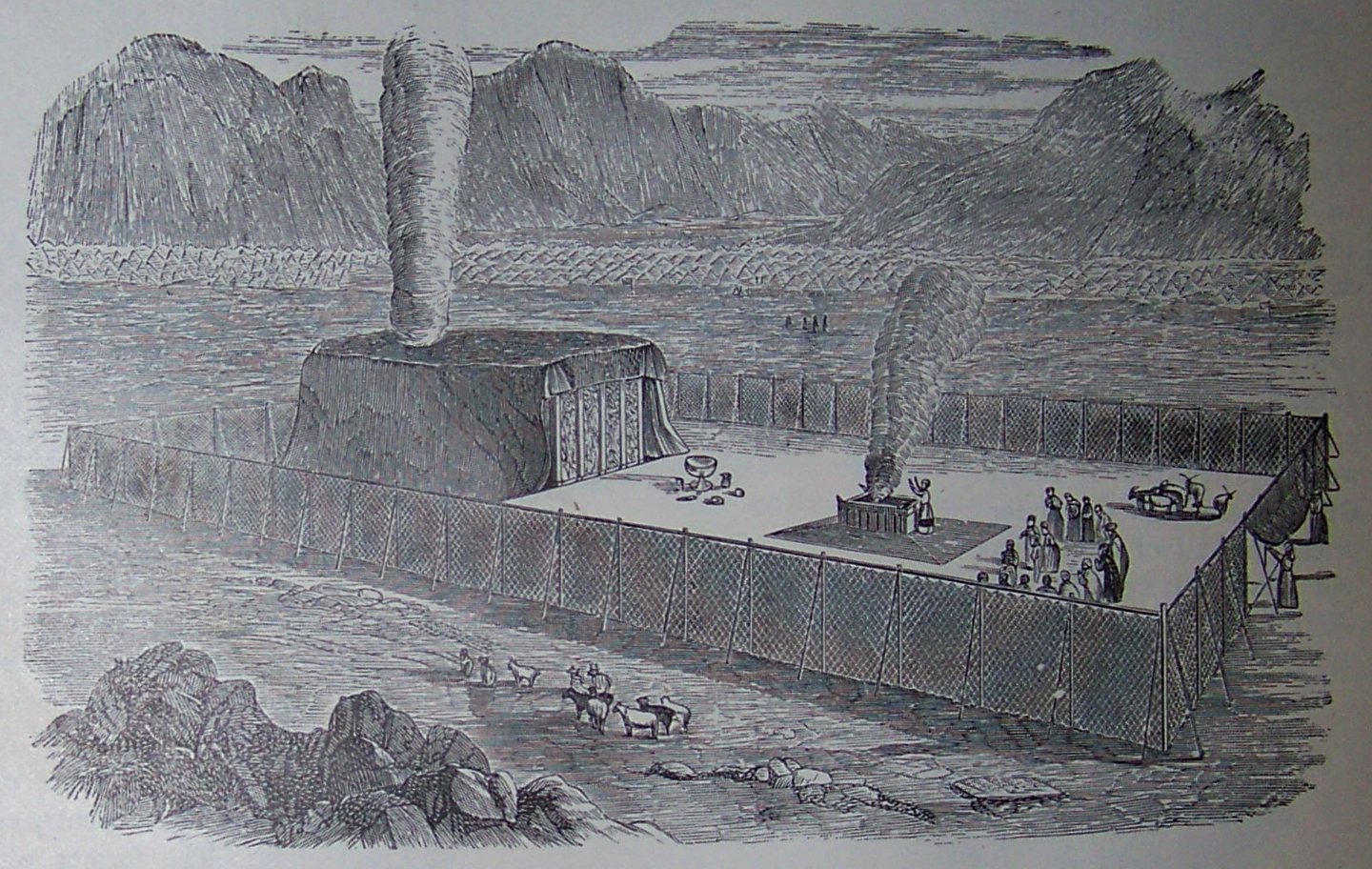
This journey will not end until we are made completely new in Messiah’s Kingdom. Until then, His Thought remains far above our own. Yet there is hope, and there is responsibility on our part, just as the Apostle Paul admonishes us:
Therefore I urge you, brethren, by the mercies of God, to present your bodies a living and holy sacrifice, acceptable to God, which is your spiritual service of worship. And do not be conformed to this world, but be transformed by the renewing of your mind, so that you may prove what the will of God is, that which is good and acceptable and perfect. (Romans 12:1-2 NASB)
This is a process, just as building the Tabernacle was a process. Yet one day the Glory of the Lord will fill the Tabernacle of His people, just as He filled the Tabernacle of Moses, and the Temple of Solomon, Son of David (I Kings 8:5-11). Then we will move when He moves, and stand when He stands. But we begin by resting in Him on the day He has chosen.
חְַזַק חְַזַק וְנִתְחַזֵק
Chazak Chazak v’nitchazek
Be strong, be strong, and may we be strengthened!
Please click here to return to the beginning of this series.
Please click here to return to Fox Byte 5775 #21: Ki Tisa (When You Take).
Please click here to continue to Fox Byte 5775 #24: Vayikra (He Called).
Please click here to return to the Fox Bytes 5775 menu page.

